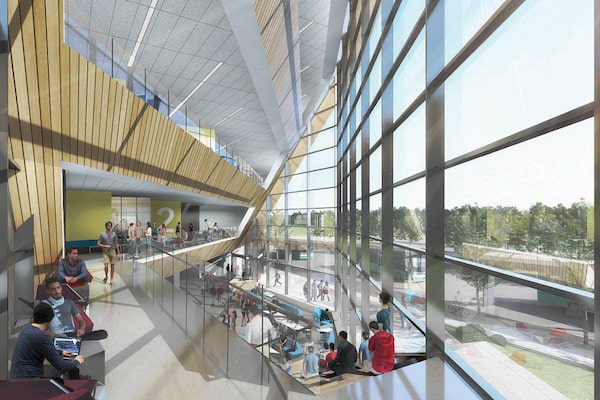
At the purpose-built Barrett Centre for Technology Innovation at Humber College, industry and community partners, students and faculty collaborate to advance cutting-edge projects.
When 416 Automation Inc. needed to design and develop robotic technology that could test any car seat function in automotive factories, they partnered with Humber College to make it happen.
Humber's research team, including faculty members Neal Mohammed and Mohammad Al-Rady and electromechanical engineering technology students Theodor Willert and Joshua Donnelly-Robertson, worked with 416 to create the SeatBOT. Now in operation in factories, the fully automated solution has changed automobile quality control, and demand continues to grow. "It's a tremendous global success story," says Humber's dean of applied research and innovation, Dr. Darren Lawless. "They're selling worldwide, and 416 recently opened up new manufacturing facilities in Korea, because they've expanded as much as they could in Canada."
It is also a success story for the students: Mr. Willert went on to win gold in the Skills Canada Mechatronics Competition, and Mr. Donnelly-Robertson was hired by 416 Automation along with two other Humber graduates.
Humber has a long history of successful partnership with companies in the Toronto region and beyond, from leading international industry giants such as Magna to local startups. Until recently, however, these opportunities were limited by the amount of lab space available. With support from the federal and provincial governments as well as a $5-million donation from the Barrett Family Foundation, that will change this spring.
The new 93,000-square-foot Barrett Centre for Technology Innovation (CTI) includes interactive makerspaces, multimedia and design studios, state-of-the-art software and equipment, and a digital visualization room. For companies, the CTI's collaborative approach will reduce R&D costs and risk, facilitating technological advancements and growth; for students, the new centre makes it possible to work alongside more companies on cutting-edge projects.
"This is purpose-built, flexible space where we can work with our industry and community partners, engaging our students and faculty to help find solutions," says Dr. Lawless. "We've created problem-based teaching spaces; we can roll in equipment and use the space for the four or six months it takes to complete a project, then take all the equipment out and prepare for the next."
For Humber's students, these partnerships provide hands-on learning experiences as well as clear pathways to employment in their field after graduation, says Dr. Lawless. "We want to engage them in real-world solutions. There's no better way to reinforce what is taught in the classroom than to put that knowledge to work."
It's all part of Humber's centre of innovation concept, he adds. "We're able to blend different skillsets from different schools and departments, all with the goal of helping companies grow – because, as they grow, they become a source of potential employment for our students."
About Colleges and Institutes Canada
Colleges and Institutes Canada (CICan) represents Canada's publicly supported colleges, institutes, cegeps and polytechnics, which work with industry and social sectors to train learners of all ages and backgrounds at over 420 campuses serving urban, rural and remote communities across Canada.
For more information, visit www.collegesinstitutes.ca.
Advertising produced by Randall Anthony Communications. The Globe's Editorial department was not involved in its creation.